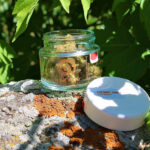LOS ANGELES–With new California cannabis product testing and packaging regulations scheduled to take effect on July 1, legal cannabis manufacturers, distributors, and retailers are feeling increased growing pains as they struggle to fall into compliance.
As mandated in 2016, when cannabis was legalized in California under Proposition 64, after July 1, cannabis flower growers will have to meet nearly organic standards with seed-to-sale documentation. Cannabis products will be required to be lab-tested, compliantly labeled, and wholesaled through state-licensed distributors. Cannabis product packaging must also be child-resistant, including carry bags for retail purchases. Edibles that contain over 100mg of THC will be prohibited.
Consumers, meantime, can stock up on products that will not meet compliance by the required date, through the end of June and while supplies last. At retailer MedMen, the largest chain of retail cannabis stores in California, the flagship West Hollywood location was busy this week with customers looking to take advantage of fifty percent off deals on flower, concentrates, vape cartridges, edibles, and more.
“The new packaging regulations have caused the entire industry to scramble,” cannabis manufacturer Henry’s Original Chief Executive Officer Jamie Warm told mgretailer. “There’s a lot of flower on the market but not a lot of legal flower. At Henry’s Original, we prepared for this and we’re doing business as usual. All testing is done by Anresco and SC Labs, which provide us with fully compliant test results for July 1.”
“We’ve noticed an extraordinary uptick in sales demand for our flower due to the new regulations because many retailers are concerned that they’ll be in short supply of compliant flower. The only adjustment to our plans is to scale up our processing center to meet demand,” Warm added.
Cannabis companies that planned ahead may be able to absorb increased costs with early implementation of inventory and compliance strategies, but many industry insiders acknowledged the regulations are challenging and the changes, costly. Those with a steep compliance learning curve or limited capital may not survive the new climate with less than two weeks for companies to fall into line.
“I do believe the consumer wants to know that they’re getting a tested and clean product, and it does indeed benefit the consumer,” Warm said, but speculated increased costs may also be passed on to consumers.
“The regulations helps some businesses and damages others. It completely depends how much liquid the company has because the new testing and logistical costs severely affect everyone’s bottom line,” he explained. “Ultimately the hard cut-off date for product to meet the new regulations without grandfathering in the product that was already entered into the supply chain has increased cost, which in turn, creates a higher priced product to the customer.”
Bryce Berryessa, president of manufacturer/distributor La Vida Verde and chief executive officer at Santa Cruz, California’s Treehouse dispensary, said, “There has never been a industry in the history of this state that has had to undergo so many changes in such a short period of time. We’re having to make monumental shifts to our business, while the rules on how we are meant to operate are still evolving and in flux.”
On the distribution side, Berryessa noted, “The additional costs of regulations and testing are forcing us to drop many SKUs from our catalogue. This will inherently lead to fewer options for patients and consumers across the board, as many manufacturers are having to increase their inventory levels and batch sizes to account for the continued increase in testing costs.”
“Our packaging costs have increased over five times what it was in 2017,” Berryessa said, speaking as a retailer. “In order to meet compliance CRP (child resistant packaging) we have also had to move away from primarily recyclable options to less environmentally-friendly packaging. Our vendors have to come up with options that are compliant but also add so much excess and waste in the packing.”
“Wholesale costs on products have increased across the board and we anticipate they will continue to rise, as more regulations and testing requirements kick in,” he predicted.
“Any continued increase in our pricing will hurt our business–especially when there is an illicit market of delivery services and dispensaries openly advertising on venues like Weedmaps and undercutting our pricing by 30-40 percent since they are not subject to the same taxes, costs, and rules,” Berryessa added, raising the issue of well-entrenched black market vendors that grow, produce, distribute, and retail illicit products, in competition with legal vendors.
At Lowell Herb Company, manufacturer of California’s most popular pre-roll, Chief Executive Officer David Elias said that early planning has held compliance pains down to a minimum for the company, though they are rolling out new child resistant packaging on packs of pre-rolls.
“As the number one selling pre-roll in the state, our team is hyper-focused on freshness and we carefully monitor our inventory levels. We have a new custom customer child resistant pack that is now being shipped to stores and we’ve almost fully run out of our non-CR packs prior to this release,” Elias explained. “We’re thrilled to launch our new nationally-certified child resistant packaging, which we believe will delight our customers.”
“[The packaging standards are] a bit strict for flower,” he mused. “With that said, we are happy to comply with these new rules. As for all of the labeling, testing, and origin specification, we were doing this before these laws were put in place. We believe that all customers should be provided this information, so we welcomed these changes.”
At The WEED dispensary, located in Studio City, California, partner Stewart Stinson agreed with Lowell’s Elias, adding that other adult-use products do not need to meet overly stringent packaging requirements.
“I feel like the new regulations are overkill for cannabis. Anyone can go buy a bottle of liquor, unscrew the top and drink it,” Stinson reasoned. “Similar with tobacco; but cannabis customers have to get through a childproof lock to get their product. Seems odd, considering those other two products are proven to cause major health issues and even death. It is a hurdle for everyone to get through the red tape, and that will drown some manufacturers, vendors, and cultivators.”
Retail management solution software Treez offers retailers options to help with the transition to increased compliance, while the Treez development team works diligently to keep up with changing regulations, as well as competitors in the retail software business.
“A majority of the stated packaging and labeling requirements are not met,” said John Yang, chief executive officer at Treez. “Compliance enforcement–via label inspection–is the lowest hanging fruit, and our retailers must print additional info labels within Treez to fully comply with the labeling requirements.”
Other regulatory inconsistencies have been difficult for retailers who already have their hands full with the July 1 deadline looming, according to Yang. Few can predict how increasing regulation will play out for individual businesses, but adaptability will be key as standards and best practices are established by the state.
“Accurate excise tax calculations continue to be a challenge,” he said. “Many operators are over-taxing and spending too much time figuring out what is due, owed, and paid. We implemented a Treez tax module that’s similar to Avalara, in automating the correct arms vs. non-arms excise tax calculations. In addition, it is critical to account for the right delivery tax rates across the multiple layers of taxation (excise, local and state).”
Yang added, “Overall, these are welcome changes that help legitimize the canna-businesses. We are working hard at Treez to adapt the systems and workflow changes needed for our operators to distance themselves from the pack.”
Hopeful that California consumers will seek out clean, legal cannabis, Palm Springs Safe Access dispensary President Robert Van Roo remained optimistic.
“At Palms Springs Safe Access, we believe California’s new regulations legitimize the cannabis industry and level the playing field as bad actors are weeded out,” Van Roo said. “We’ve been doing full spectrum testing since 2012, well before regulations, and it’s only made our products better and our consumers happier.
“The California cannabis industry is fortunate to have state agencies that are focused on working with us through this process,” he pointed out. “Change is never easy but we think it’s worthwhile. Companies and regulators alike are learning together, as we slowly perfect one of the best state regulatory systems to date.”
(Photo: Courtesy Tim Parkinson)













